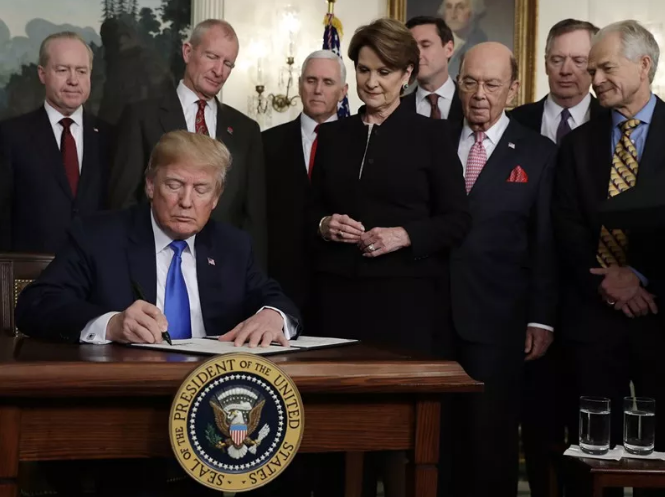


President Donald Trump signs Presidential Memorandum imposing tariffs and investment restrictions on China, in the Diplomatic Reception Room of the White House, Thursday, March 22, 2018, in Washington. (Xinhua Photo)
Read More: China readies as Trump's trade war plan spells failure
Chinese Ambassador to the US Cui Tiankai said Thursday China will retaliate after U.S. President Donald Trump signed a memorandum that could impose tariffs on up to 60 billion U.S. dollars of imports from China.
“We do not want a trade war with the United States or with anybody else, but we are not afraid of it. If somebody tries to impose a trade war upon us, we will fight. We will do whatever we can to defend the legitimate interests. We will also do whatever we can to safeguard the open global trading system,” said Cui in a video posted on the embassy’s Facebook account.
Trump has directed U.S. Trade Representative Robert Lighthizer to publish a list of proposed Chinese goods that could be subject to tariffs in 15 days, while the U.S. Treasury Department will have 60 days to propose restrictions on Chinese investment in the United States, according to the presidential memorandum.
The tariffs "could be about 60 billion" dollars, Trump said Thursday at the White House before signing the memorandum. But a senior White House official told reporters earlier in the day that the number would be close to 50 billion dollars.
In the video post in response to the announcement, Chinese Ambassador Cui Tiankai sent a strong warning to “those people who intend to fight a trade war.”
“We will certainly fight back. We will retaliate. If people want to play tough, we will play tough with them, and see who will last longer,” he said.
He also warned that a unilateral approach, protectionist approach or a trade war will not help anybody and will hurt American people and businesses because it makes no economic or political sense.
“So the end of it will be hurting everybody. It will certainly affect the daily lives of the American middle class people. It will affect the balance sheet of American companies. It will affect the indexes of the financial market. It will undermine people’s confidence in the long-term economic prospects. I don’t think anybody can gain anything from it,” the ambassador said.
Trump’s memorandum is based on a so-called Section 301 investigation into alleged Chinese intellectual property and technology transfer practices, launched by the Trump administration in August 2017.
Section 301, once heavily used in the 1980s and the early 1990s, allows the U.S. president to unilaterally impose tariffs or other trade restrictions on foreign countries. But the United States has rarely used the outdated trade tool since the World Trade Organization (WTO) came into being in 1995.
"It became no longer necessary really for the United States that they have to use that law, because now we have an effective dispute settlement system under the WTO," said Chad Bown, a trade expert and senior fellow at the Washington D.C.-based Peterson Institute for International Economics (PIIE).
The memorandum follows Trump's recent tariff plan on steel and aluminum imports and January's tariffs levied on imported solar panels and washing machines. These unilateral moves have prompted strong opposition and warnings from business groups around the world.
In a letter to Trump on Sunday, 45 U.S. trade associations, representing retail, technology, agriculture and other consumer-product industries, urged the administration not to move forward its tariff plan on Chinese imports, as it would hurt U.S. consumers and companies.
A group of 25 major U.S. retail companies, including Walmart, Costco and Best Buy, also warned on Monday that any additional broad-based tariff would worsen U.S. inequity and "punish American working families" with higher prices on household basics like clothing, shoes and electronics.
If the Trump administration imposes a 25-percent tariff on information and communications technology imports from China, it would cost the U.S. economy 332 billion dollars over the next 10 years, according to a report recently released by the Information Technology and Innovation Foundation, a U.S. technology policy think tank.
"Simply put, tariffs are damaging taxes on American consumers," said Thomas J. Donohue, President and CEO of U.S. Chamber of Commerce, warning the Trump administration's tariff plan could lead to "a destructive trade war" with serious consequences for U.S. economic growth and job creation.
"Tariffs of $30 billion a year would wipe out over a third of the savings American families received from the doubling of the standard deduction in tax reform. If the tariffs reach $60 billion, which has been rumored, the impact would be even more devastating," Donohue said.

 Award-winning photos show poverty reduction achievements in NE China's Jilin province
Award-winning photos show poverty reduction achievements in NE China's Jilin province People dance to greet advent of New Year in Ameiqituo Town, Guizhou
People dance to greet advent of New Year in Ameiqituo Town, Guizhou Fire brigade in Shanghai holds group wedding
Fire brigade in Shanghai holds group wedding Tourists enjoy ice sculptures in Datan Town, north China
Tourists enjoy ice sculptures in Datan Town, north China Sunset scenery of Dayan Pagoda in Xi'an
Sunset scenery of Dayan Pagoda in Xi'an Tourists have fun at scenic spot in Nanlong Town, NW China
Tourists have fun at scenic spot in Nanlong Town, NW China Harbin attracts tourists by making best use of ice in winter
Harbin attracts tourists by making best use of ice in winter In pics: FIS Alpine Ski Women's World Cup Slalom
In pics: FIS Alpine Ski Women's World Cup Slalom Black-necked cranes rest at reservoir in Lhunzhub County, Lhasa
Black-necked cranes rest at reservoir in Lhunzhub County, Lhasa China's FAST telescope will be available to foreign scientists in April
China's FAST telescope will be available to foreign scientists in April